Dogs have become an inseparable part of human life, providing companionship and a wide range of other health benefits. Owning a dog has been shown to reduce anxiety, provide sensory stress relief, and promote more exercise and fresh air. In return, you provide your dog with food, shelter, plenty of belly rubs, occasional vet visits, and all the love you could possibly muster.
Unfortunately, even when following all the right steps, dogs can potentially feel a little under the weather. They can get upset stomachs, which can eventually lead to vomiting and diarrhea, which isn’t fun for anyone. Read on to learn more about vomiting and diarrhea in dogs, what causes both conditions, and some remedies to prevent and treat them.
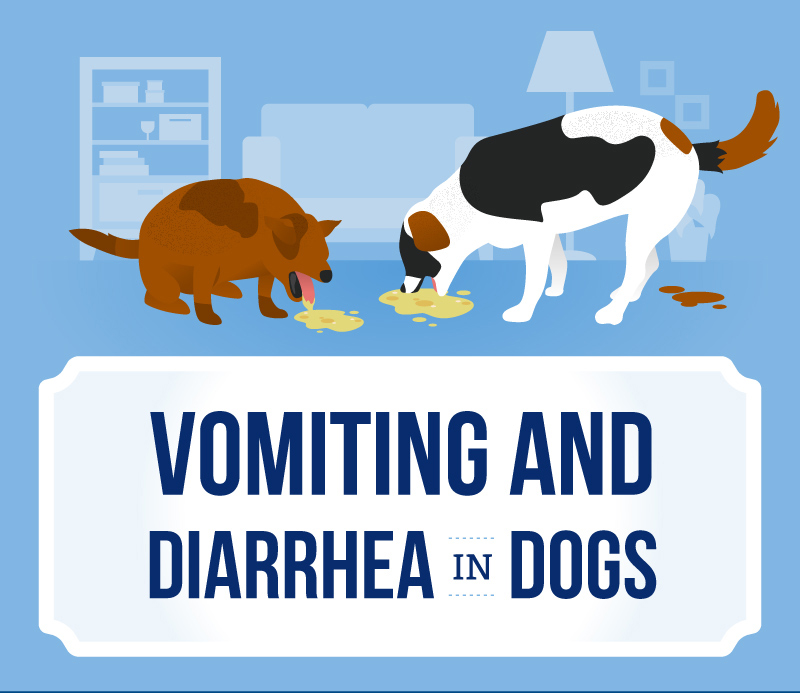
Understanding the Doggy Digestive System
Dogs have digestive systems that are completely different from humans’. In humans, the jaw shape and saliva begin to break down foods immediately in the mouth. Dog mouths are designed for crushing and tearing, while their saliva is more for killing bacteria than breaking down food, which is why they can eat raw meat and other things that would send most humans to the hospital.
Most of the digestion happens in your dog’s stomach, where the food enters in chunks. Your dog’s stomach acids are nearly three times more potent than an average human’s stomach acid, so they can break down food that is practically swallowed whole. From mouth to colon, food takes about 10 hours to digest in your dog’s body, but dogs can still succumb to vomiting and diarrhea.
As unpleasant as it is, vomiting is a natural instinct for both animals and humans. It’s a means of emptying the stomach of indigestible or otherwise unwanted material, preventing it from getting further into your system.
It can also occur when your dog’s gastrointestinal tract is irritated or due to any sort of colonic stimulus. Diarrhea often occurs when that unwanted or indigestible material makes its way fully through your dog’s digestive system.
However, both vomiting and diarrhea have different causes, some serious, some less so.
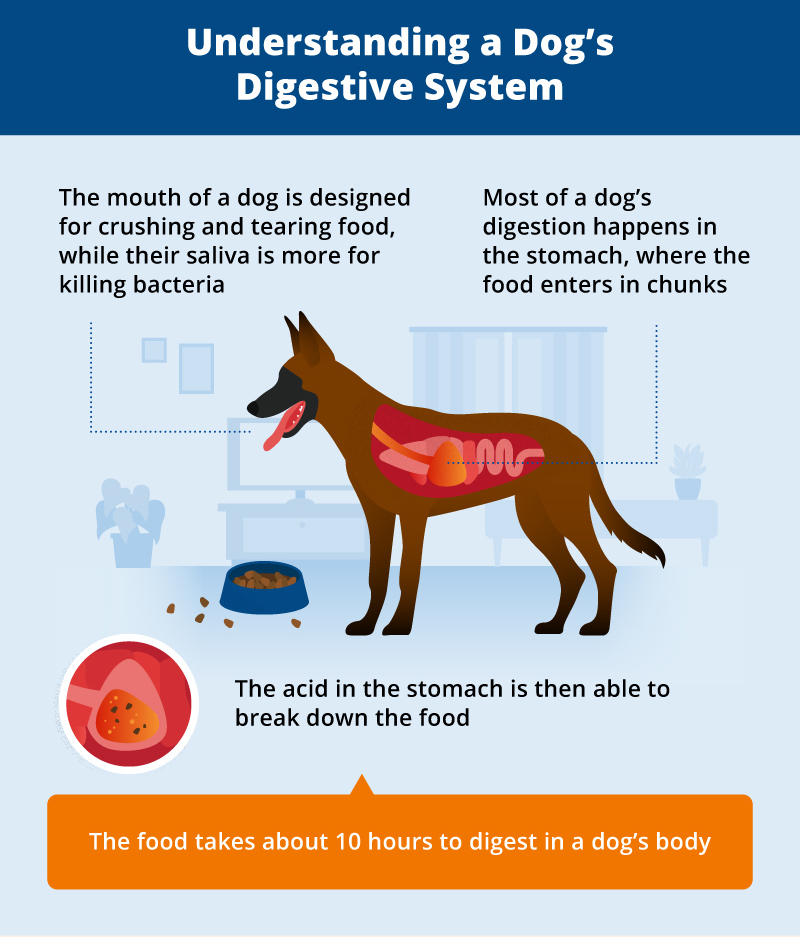
Causes of Diarrhea in Dogs
Dogs can have diarrhea for four basic reasons:
- Over-secretion: The intestine secretes too much fluid during digestion as a result of being exposed to toxins or bacteria.
- Osmotic imbalance: This occurs when the intestines contain a high concentration of food. The excess molecules draw more water into your pup’s intestines, leading to diarrhea.
- Intestinal exudation: Intestinal exudation occurs when ulcers or other sores in the intestinal walls cause a slow leak of blood.
- Motility disorders: These disorders refer to how active the intestines are and how efficiently they move material through. One condition known as peristalsis occurs when a dog’s intestines are unable to properly push food remains through the canal. Alternately, the intestines may move materials too quickly. In this case, fluid that doesn’t have a chance to get absorbed will be forced out with the feces.
There are a variety of things that can potentially trigger these conditions, but the most common include:
- A bad diet, including eating rotten food, eating garbage, or just eating too much (in vet circles, this is known as garbage gut or garbage toxicosis).
- Food intolerance (for example, most dogs grow lactose intolerant)
- Switching to a different food or diet
- Parasites, particularly hookworms, roundworms, and whipworms
- Food allergies
- Swallowing something that isn’t digestible, like part of a toy or bone
- Poisonous plants or other substances
- Bacterial infections, like salmonella
- Extreme emotional stress and anxiety
- Certain infections, including distemper, coronavirus, and parvovirus
- Certain illness, including cancer, liver disease, kidney disease, colitis, and inflammatory bowel disease
- Antibiotics and medications

Causes of Dog Vomiting
Dogs can vomit for numerous reasons, many of which are similar or related to what might cause diarrhea. Some other causes include:
- Motion sickness
- Ingestion of insecticides, pesticides, or other toxic products
- Pancreatitis
- Infections and ulcers
Dogs may also throw up as a reaction to a new drug or medication.
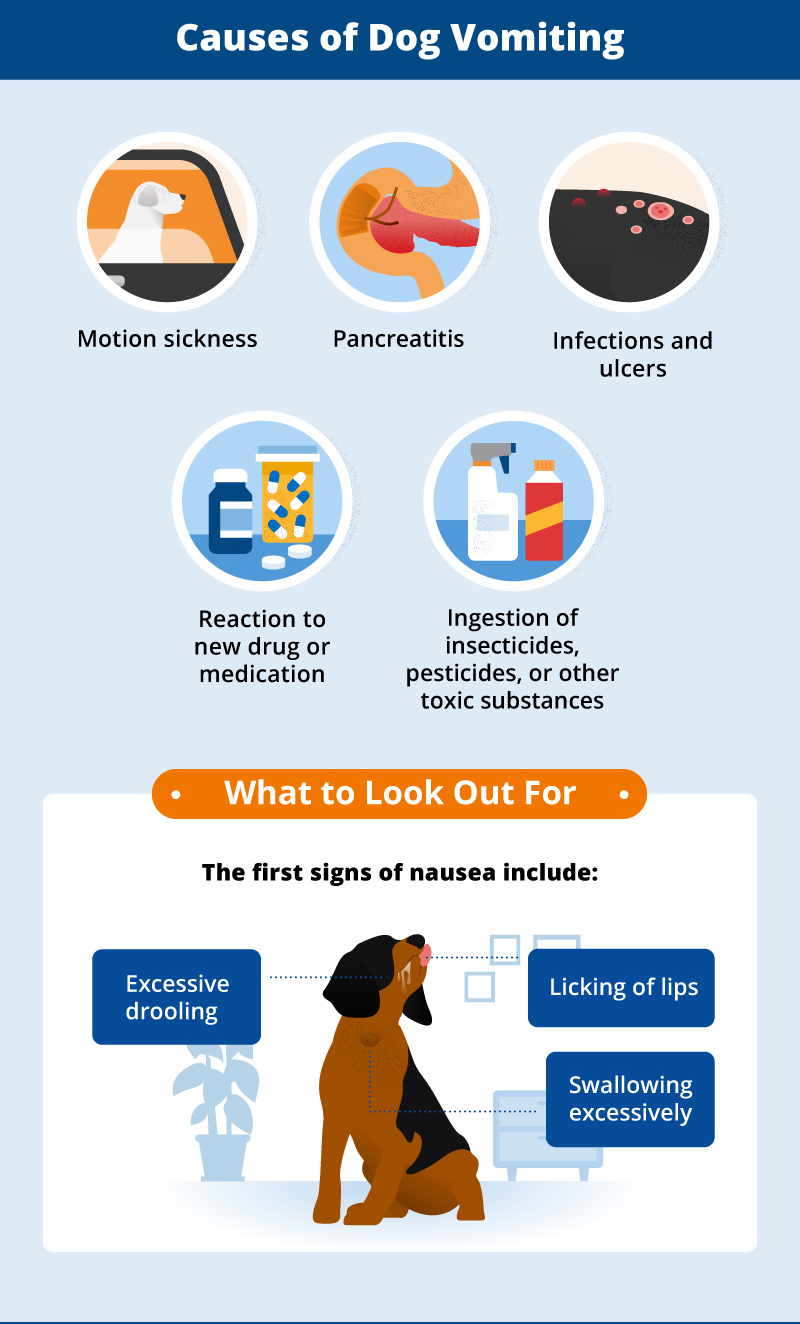
What to Keep an Eye Out For
There’s not much you can do to predict a dog’s diarrhea until it actually happens. For nausea and vomiting, the first sign is often excessive drooling, licking of lips, and swallowing. Some dogs will start eating grass either to relieve any irritation or indigestion or induce vomiting.
While vomiting and regurgitation often look the same, they do have their distinct differences. Regurgitation occurs spontaneously and comprises expelling undigested food without any abdominal effort. This points to possible problems in the esophagus or somewhere early in the digestive process. Regurgitation has its own specific set of possible causes.
What to Do When Your Dog Vomits
For occasional or infrequent vomiting:
- Avoid giving your dog food for the next 12 hours. You can give him up to 3 tablespoons of water every 30 minutes or provide ice cubes for him to lick and munch on.
- After the 12 hours, reintroduce his water bowl.
- Provide bland food. Most people go with white rice and cooked chicken, but any combination of lean meat and starch can work. Keep the ratio to about one-part lean meat to every five-parts starch.
- Start feeding your dog a few teaspoons of the chicken and rice. If he can keep it down, feed him a little every hour or two.
- If vomiting stops, you can begin feeding your dog his normal food the next day.
For more severe cases of vomiting:
- Remove any food that your dog can get to.
- Inspect your pup for signs of dehydration and/or shock, which include pale skin and gums, abnormal disposition, and coma or collapse.
- If your dog exhibits any severe symptoms, take him to the vet immediately.

How to Prevent Vomiting and Diarrhea in Dogs
While there are some vomit and diarrhea triggers that you can’t prevent or even detect, you can generally prevent both as long as you pay attention and follow certain rules:
- Do not allow your dog to scavenge around garbage or outside. That’s the main way that dog’s get garbage gut.
- Don’t give your dog toys that easily fall apart, are easily swallowed, or otherwise chewed into pieces. This can lead to irritation of the intestines or stomach.
- Avoid giving your dog bones, which are often implicated in vomiting. Ask your vet for recommendations of safe chewables.
- When you’re at the park or taking your dog for a walk, keep an eye on him to make sure he doesn’t eat things he shouldn’t. A basket muzzle can keep your dog’s mouth shut to prevent this.
- Sudden diet changes can lead to vomiting. When introducing a new food, do so gradually to prevent upset stomachs and irritated intestines.
- Avoid overly stressful activities or look up proper means of relieving stress in your dog.
A general rule of thumb is to provide a high-quality diet that is filled with all the vitamins and nutrients your dog needs. This may mean including a hemp supplement, like those found at Canna-Pet. Activated hemp supplements can benefit other areas of your dog’s health, including anxiety relief, improved skin, and support for your dog’s nervous system.
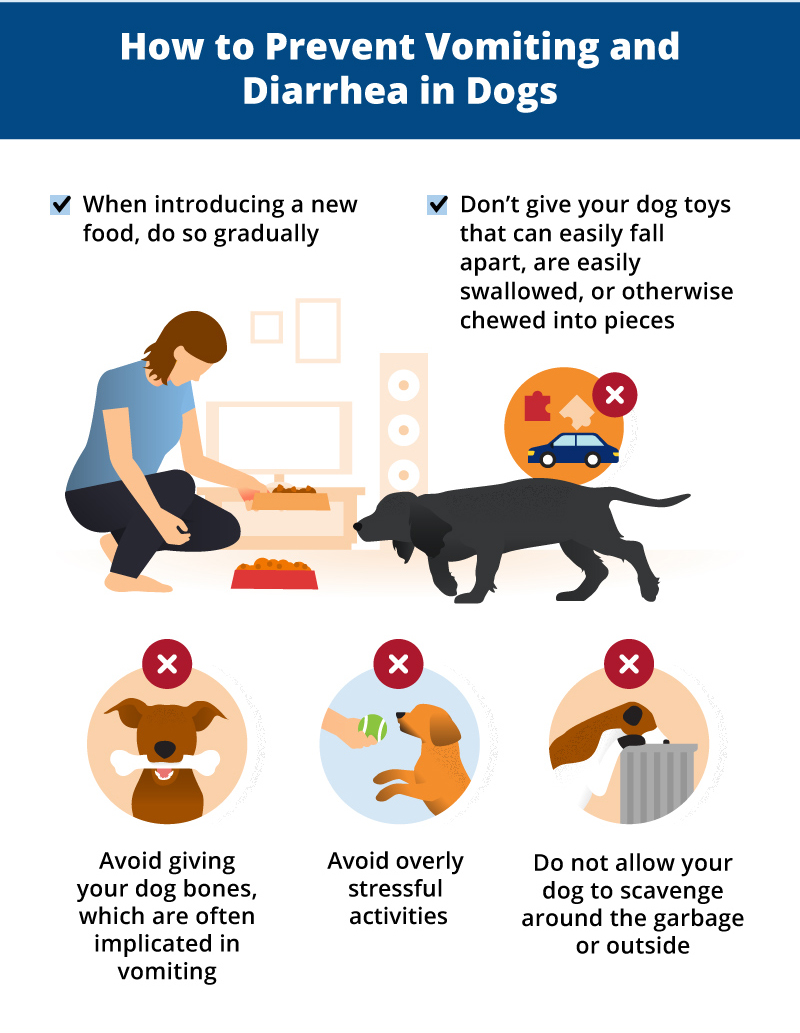
Dog Diarrhea Treatment
Many cases of dog diarrhea can be treated without the need of professional medical intervention. The most prominent home remedy to treat diarrhea is fasting. Keeping your dog away from food for up to a day can help his stomach settle. Make sure to provide small amounts of water or ice cubes to ensure that your dog stays properly hydrated. You may also consider providing your pup with coconut water or unflavored Pedialyte to ensure he has enough electrolytes.
One thing to note: make sure your dog is actually strong enough to endure a fast. Older dogs and puppies need their nutrients to maintain good health. Starving for a day may not be the best solution. Smaller dogs may also not have the same hardiness to maintain a full day of fasting.
Other remedies for dog diarrhea that you should be able to find in your cupboards include:
- White rice
- Yogurt, kefir, and other foods containing probiotics (beneficial gut bacteria), though be careful as some dogs may have stomachs too sensitive to probiotics, leading to more diarrhea
- Boiled potatoes with their skins removed
- Plain canned pumpkin (not the stuff used in pumpkin pie filling)
- Eggs, chicken, and other simple proteins prepared plainly
- Rice water
- Cottage cheese (only if your dog can tolerate milk and dairy products)
- Certain over-the-counter drugs, like Pepto Bismol, but be cautious and consult your veterinarian before ever administering any human medication to your pet
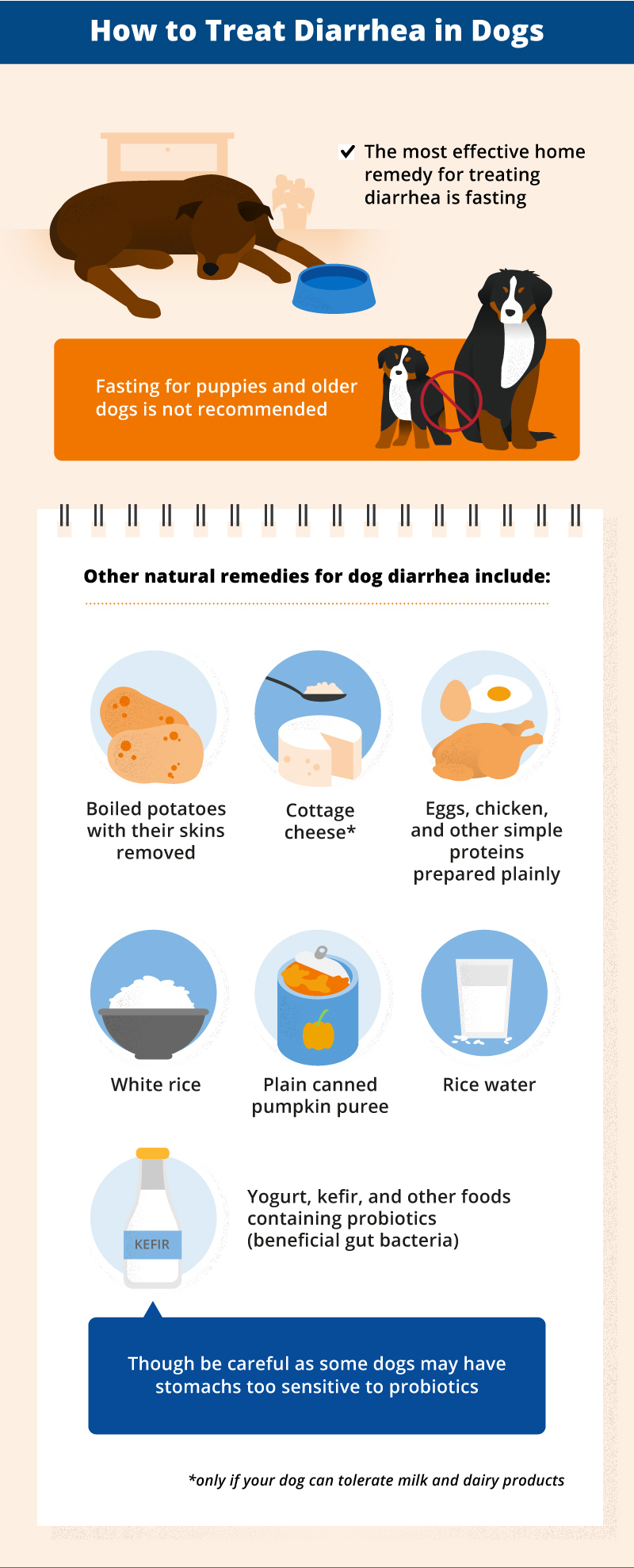
Remedies for Vomiting in Dogs
Similar to diarrhea, fasting is a possible remedy for vomiting, but there are plenty of other things you should provide your pup.
- Maintain a good, comfortable body temperature. Cooler temperatures tend to be better as a warm environment may only contribute to dehydration. When your dog has calmed, take him on short walks, but otherwise, try to keep him indoors.
- Provide foods rich in fiber. Fiber reduces distress in your dog’s digestive system, helping to clean out any toxins contributing to an upset stomach. Fiber-rich foods that are safe for your dog to consume include canned pumpkin, rice, and sweet potato.
- Mix one teaspoon of baking soda in a half a cup of water. Give your dog a few sips of this mixture every 1 or 2 hours. This is a simple home remedy, but it can help relieve pressure while neutralizing acids in the body.
- Lactobacillus acidophilus is a probiotic that is safe for your dog to consume, but you can also find it in capsule form. Simply mix the capsules in water. Acidophilus is also present in plain, low-fat, low-sugar yogurt. Dose based on size:
- Small dogs should get 1 to 2 teaspoons.
- Medium dogs can take 1 to 2 tablespoons.
- Larger dogs can take up to 4 tablespoons.
- Ginger tea is just as soothing and healthy for dogs as it is humans. Ginger is known to act as a powerful aid in digestion. To make ginger tea, pour 1 teaspoon of ginger powder or 1 tablespoon of freshly grated ginger root into a half cup of coconut milk. Let it simmer for about 10 minutes. Let it cool down to about room temperature to keep your dog from scalding itself. Give him up to 3 teaspoons of the tea every 1 to 2 hours.
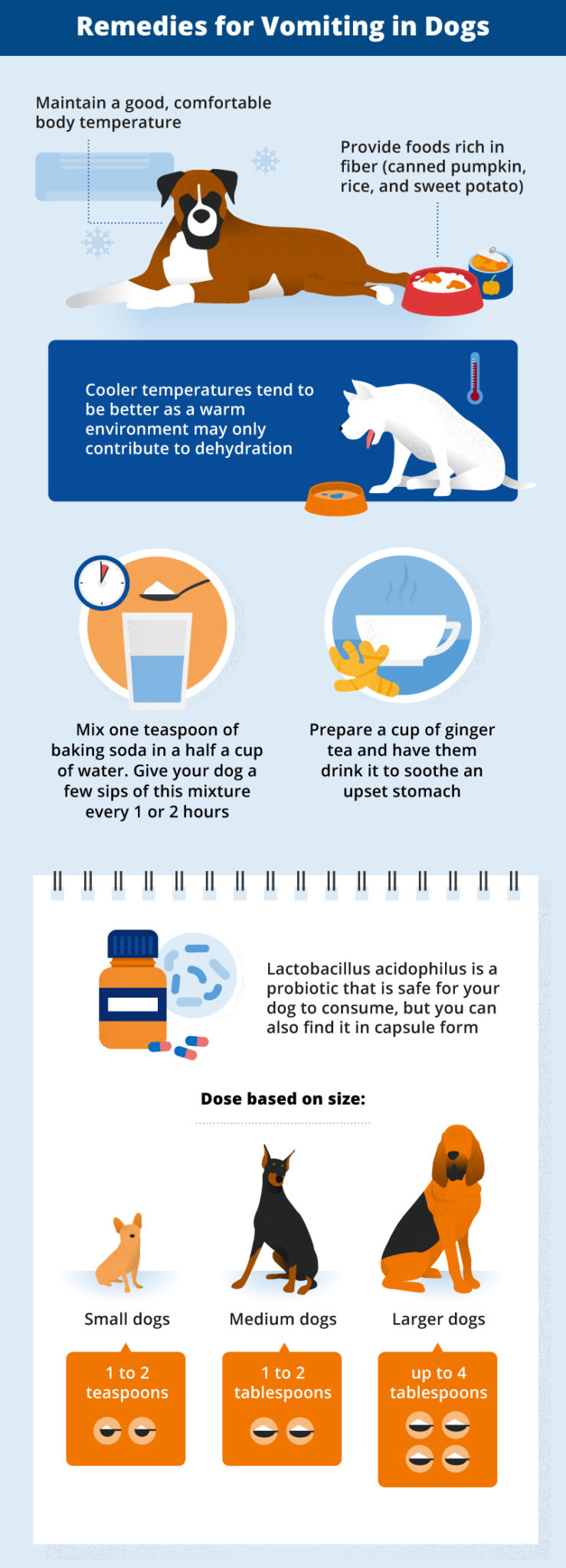
When the vomiting or diarrhea has subsided, keep a close eye on your dog to observe any severe problems that warrant a visit to the vet. In terms of vomiting, severe cases often involve lethargy, continued dry heaving, and an inability to keep down water.
For diarrhea, check the consistency and color of the feces and the frequency that your dog goes to the bathroom. White spots appearing as rice grains point to parasites, while black, tarry stools suggest bleeding in your dog’s gastrointestinal tract.
As a dog owner, you should also just know if things seem off or abnormal. Trust your instincts. If you think something is wrong, contact your vet immediately.
Sources:
- Werber, Jeff. “When Is It Time To Panic? Evaluating Emergency Situations.” Pet Health Network, Accessed 1 Dec. 2016. www.pethealthnetwork.com/dog-health/dog-diseases-conditions-a-z/when-it-time-panic-evaluating-emergency-situations.
- “Vomiting and Diarrhea (Gastroenteritis) in Dogs and Cats.” Vetstreet, 24 Mar. 2014, Accessed 1 Dec. 2016. www.vetstreet.com/care/gastroenteritis-vomiting-and-diarrhea-in-dogs-and-cats.
- Barchas, Eric. “When to Take Your Dog to the Vet Immediately.” Dogster, 20 June 2017, Accessed 1 Dec. 2016. www.dogster.com/lifestyle/12-dog-health-emergencies-immediate-veterinary-attention-ask-a-vet.
- “What to Do When Your Dog Vomits or Has Diarrhea.” PetMD, Accessed 1 Dec. 2016. www.petmd.com/blogs/nutritionnuggets/jcoates/2012/mar/when_your_dog_vomits_has_diarrhea-13351.
- “Vomiting and Having Diarrhea in Dogs – Definition, Cause, Solution, Prevention, Cost.” WagWalking, 29 May 2017, Accessed 1 Dec. 2016. www.wagwalking.com/symptom/why-is-my-dog-vomiting-and-having-diarrhea.




